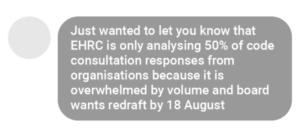After a cache of leaked documents showed the Equality and Human Rights Commission (EHRC) is planning to ignore half of the responses to its flawed consultation, further analysis has revealed the reason why. The commission wants to finalise the redrafted guidance this consultation was supposed to inform by 18 August.
The EHRC has been in a rush to upend rights trans people have relied on for years ever since the Supreme Court delivered its judgment in April. It was only eight days later that the commission published its harmful interim guidance, without any input from the people most affected.
With trans people already suffering the dangerous consequences of the interim guidance, the EHRC launched a two-week consultation on proposals for the guidance’s final form. After a storm of criticism, the consultation was extended to six weeks – half the time period the commission offered for last year’s updates to its code of practice.
Good Law Project is powered by people across the UKDonate now
Despite this compressed timeline, more than 50,000 people took part. Good Law Project helped 2,500 people share their experiences, concerns and fears.
But a collection of chats from Microsoft Teams, which Good Law Project has obtained, shows that the commission has decided to ignore more than half of these submissions. Instead of reading all the responses, they will be processed by AI systems, despite acknowledging the risk that this may not “capture insightful … points”.
Further messages reveal the “shocking” reason why: the commission is “overwhelmed by volume” and the “board wants [the] redraft by 18 August”.

The review process will also narrow this analysis to gather all results within five themes. But the harms trans people have suffered since the Supreme Court’s transphobic judgment can’t be brushed to one side and then automatically reassembled under five headings.
A consultation is supposed to inform policy with people’s lived experience, not sweep their lives under the carpet. The commission asked people to respond. It can’t just change the rules of the game because so many people stood up to defend their rights. Having failed in their attempt to compress the process to a two-week consultation at the start, the EHRC is now trying to compress the process at the back end – at the cost of those who need their voices to be heard.
The principles that outline how public bodies like the EHRC must carry out consultations are clear: there must be “adequate time” both for people to consider the question and for them to respond. All the evidence is that the commission’s botched consultation breaches these guidelines and we have instructed lawyers accordingly. And we’ll update you as soon as we know more.
